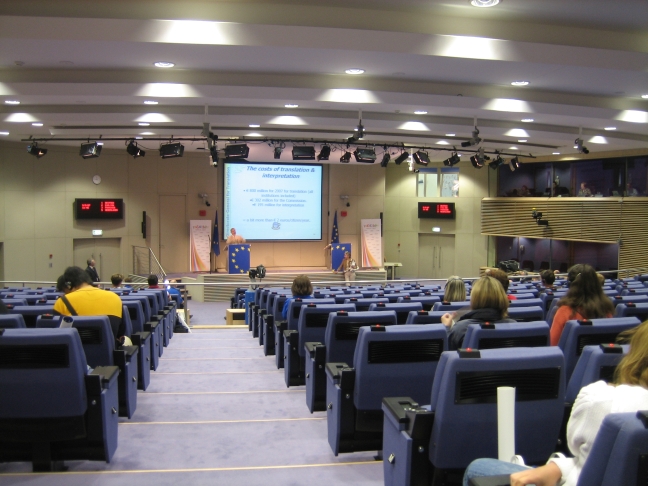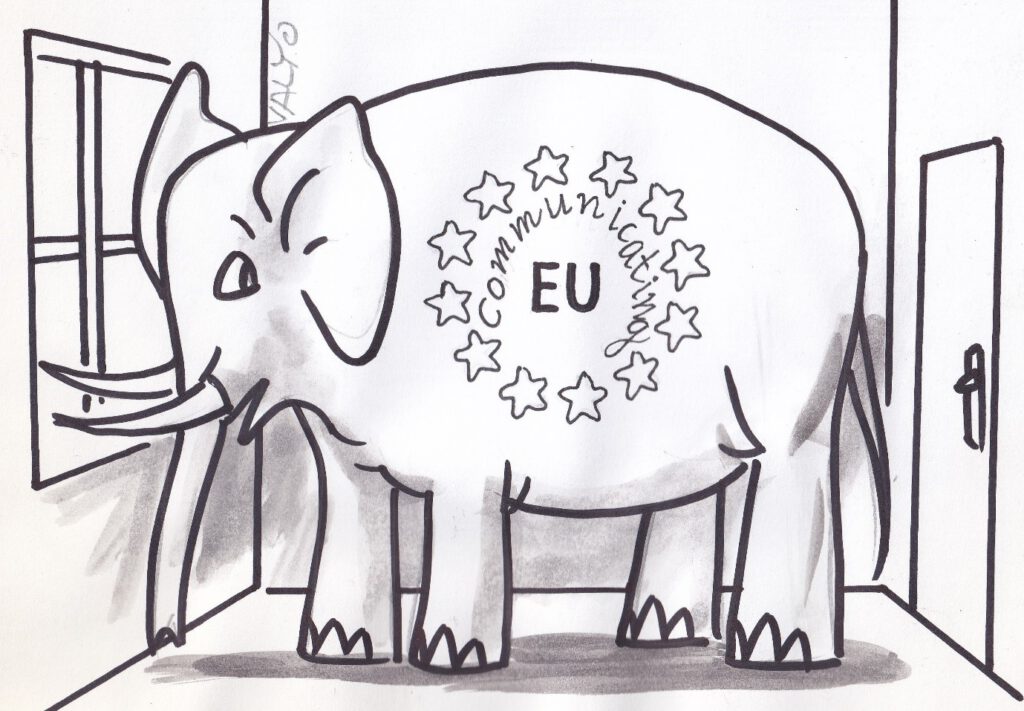When reading the EU’s policy papers to tackle fake news, one might get the impression that digitalization and fake news are the main culprits of the current challenges to journalism. Keeping the EU’s market-oriented regulations for the media sector in mind, however, Asimina Michailidou, Elisabeth Eike and Hans-Jörg Trenz argue that the understanding of media as regular businesses instead of important democratic institutions is the main problem.

Fake news as a symptom of epistemic conflict
European democracy and democratic institutions are by many considered to be under threat in this post-truth era. Digitalization is then often considered the main culprit, for having increased the spread of fake news and disinformation online and fragmenting the public sphere into different online and social media platforms where individuals are vulnerable to echo chambers and rabbit holes, causing disruptive effects to the process of democratic will formation. This disruption of the public sphere is further characterized by decreased levels of trust in journalism, which in recent years has also been undermined by more frequent attacks against freedom of speech and of the press, run especially by populist leaders and new authoritarian governments. The restoration of trust in democracy requires the restoration of trust in the democratic procedures of truth finding.
When it comes to news media and journalism, this would mean the reinstatement of the procedures of truth finding that allow the establishment of truth through argumentation in the public sphere. This process of establishing the truth requires consideration of different arguments in an open and critical exchange and is the pinnacle of democratic debate. As the American philosopher Richard Rorty famously put it in an interview to Zbigniew Stanczyk at the Hoover Institute: ‘Take care of freedom, and truth will take care of itself’.
In this case, journalism would not be expected to produce an unquestionable truth, but an unstable and preliminary outcome of the journalistic procedures of fact-finding and fact-checking. Even if the journalistic output does not receive ultimate public agreement that the information is to be valued as truth, the public can still rely on the procedures of journalism to establish truth, and trust that any counterarguments will be found, checked, and published in a similar manner. We further argue that the adherence to these democratic procedures require non-partisan journalism, independent of financial and political influence, which is not to be confused with notions of neutrality, accuracy and detachment traditionally assigned to journalism ethics. As Stephen Ward argues, journalism needs to break with these conceptions traditionally ascribed to it, if it is to better serve democracy in the era of digitalisation and globalisation.
Based on this premise, we then look at the counterstrategies for trust (re-)building that the legitimacy crisis has triggered, from a top-down perspective, and critically discuss the EU’s policies for news media and its implications for the public sphere. Assessing the EU’s response to the authoritarian and fake news challenge, we discuss the credibility of the EU’s proposals to uphold and strengthen journalism as first and foremost an important democratic institution.
Since the 1990s, extensive liberalization and marketization of the media sector has increased competition, and the need to monetize consumption- processes which in turn have increased media’s financial reliance on advertisement and the creation of media conglomerates, in some cases spanning several European countries and even continents. The recent authoritarian and populist attacks on the press and press freedom just adds to this pressure on journalists’ free exercise of their profession, further restricting their budgets and autonomy. Throughout this time, media institutions have been approached by the European Commission as both businesses and democratic institutions, and the business side of the sector continues to be highlighted throughout European Commission policy documents.
The EU’s policy against disinformation might limit the symptoms, but will not cure the disease
A first sign of a shift in this business-heavy approach, is that the European Commission explicitly recognizes the media as an important democratic institution not only in its most recent documents addressing the fake news epidemic, but also in its Action Plan for preserving democratic rule of law in the union. The Commission’s recognition of news media as “fundamental for our democracy”, with proposed initiatives to address the risks to media freedom and pluralism, including the creation of “a safer and better environment for journalists to do their work”, is encouraging, especially as it is accompanied by much needed financial support and relief for the sector. For instance, the Commission declares that it
[…] aims to support projects that address structural challenges of the media sectors and/or that promote a free, diverse and pluralistic media environment. Examples include supporting collaborative and cross-border journalism, monitoring risks to media pluralism, mapping violations of media freedom, defending journalists under threat, media innovation, supporting media literacy and strengthening the European public sphere. (…) As part of these efforts, the new Multiannual Financial Framework for the first time has a dedicated envelope for media pluralism, journalism and media literacy of at least €75 million under Creative Europe. (Funding news media sector | Shaping Europe’s digital future (europa.eu)
However, despite the strongly worded support, we find that there remains also a strong tension in EU media policy documents, between preserving the business-side and the democratic function of news media.
Take, for instance, the EU Action Plan against Disinformation, which set off with promising aims, bringing together internationally recognized experts in matters of journalism ethics, misinformation, data protection and digitalization. Despite the strong ambition and excellent expertise credentials, the European Court of Auditors’ Special Report 09/2021 published in June this year clearly states that the intended results of The EU Action Plan against Disinformation were incomplete and the Plan has not delivered on its promises.
Besides being under-funded and not optimally organized, a key shortcoming of the Plan is that it fell short of its goal of – privately-owned – online platforms accountable for their actions and their role in actively tackling disinformation. As Maarten Hillebrandt succinctly shows in his Literature Note on the Communicative Model of Disinformation, the business model of digital media platforms – particularly social media ones – incentivises the use of algorithms that increase users’ ‘screen time’; a recipe on which disinformation thrives. Privately-owned platforms will not voluntarily step away – at least not in an effective manner – from this profitable business model unless they are legally obligated and/or offered financial incentives far greater than their advertising revenues.

A post-pandemic democratic turn?
It is encouraging to see that the news media sector is finally recognized as an important democratic institution in EU policy documents, and that the covid-19 pandemic has spurred the European Commission to pledge more funding and support for the news media sector. In the words of Vice President of the European Commission, Věra Jourová,
The Coronavirus pandemic […] really showed that disinformation does not only harm the health of our democracies, it also harms the health of our citizens.
The funding earmarked in the coming years for actions that support news media in the fight against misinformation will of course also contribute to the strengthening of news media and press freedom vis-à-vis authoritarian attacks but will not do much to relieve journalism of the financial pressures to produce news for profit.
To secure democracy and journalisms democratic functions, support is needed also for the –often forgotten– public service journalism and broadcasting: relieved from exactly these pressures, it should be strengthened –with policies and funding– to provide non-partisan journalism, independent of financial and political pressure and influence. It is a core journalism vehicle through which trust in the democratic process of truth finding can be restored- yet in the Commission’s Action Plan to support recovery and transformation of Europe’s media in the Digital age (COM(2020) 784 final), public news media are mentioned once and in almost in passing. The bulk of the provisions is geared towards private media and audiovisual content providers.
However, as the Court of Auditors report on the failures of the Action plan against Disinformation has shown, EU counterstrategies against the disruptive effects of fake news and disinformation that focus on privately-owned news and social media platforms are not enough. To ensure full recovery from this epistemic crisis, journalism needs to be re-instated as first and foremost a public-service oriented, democratic institution.
Asimina Michailidou is a senior researcher at the ARENA Centre for European Studies, University of Oslo. Elisabeth Eike was an MA student at the NMBU, Ås, and the ARENA Centre for European Studies, University of Oslo from 2019-2020. Hans-Jörg Trenz is professor of sociology of culture and communication at the Scuola Normale Superiore, Pisa/Florence.



